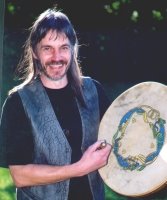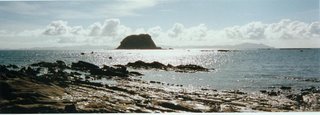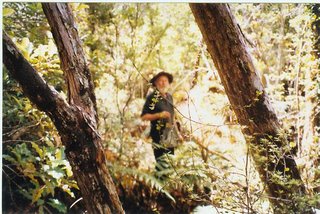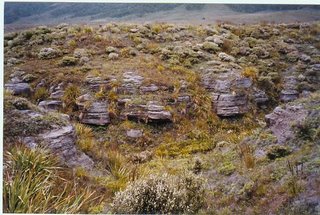I started this blog on the 14th of June, 2006, so this is The Imaginary Museum's fifth anniversary. I'm afraid that the traditional material for a fifth anniversary present is wood (though modern gift-givers have replaced that with silverware, apparently). For myself, I'm sticking with the wood.
Why? On the one hand, because it's rather shocking to look at all those posts and see just how much time I must have spent typing away in these little blogger text boxes. What a woodenhead! On the other hand, though it's nice to think how much wood-pulp I must have saved by not printing it all out ...
This blog is only part of the story, though. From the very beginning I saw this as a project space: somewhere where I could try online text experiments. The very first thing I did with it, in fact, was to put up a bunch of topographical poems about Auckland, Roadworks, linked to a game-board with twin axes of time and space (okay, maybe that one wasn't all that successful, but I was looking for a three-dimensional way of arranging texts outside the conventions of the book-codex ...)
Quickly, though, I realised that the best way to use a single centralised site, like this one, was as a crossroads to other websites, each one of which could be adjusted to display different techniques and materials. The sidebar over there will testify to the sheer number of these experiments I've done over the past five years. Basically, though, they've boiled down to one big project per year - I'm not quite sure why. Every time I complete one of these things I tell myself Never again ...
So here they are, the "big five", in rough chronological order:
- (November 6-December 3, 2007) Aotearoa New Zealand Poetry Sound Archive: Bibliographical Aids for the Use of Those Consulting the Waiata Archive (1974) and the AoNZPSA (2002-2004) - Audio Recordings available in Special Collections, University of Auckland Library and in the Alexander Turnbull Library, Wellington.
- The R.E.M. [Random Excess Memory] Trilogy (2000-2008):
- (January 19-30, 2008) [The R.E.M. Trilogy, 1]: Nights with Giordano Bruno: A Novel.
- (January 20-February 13, 2008) [[The R.E.M. Trilogy, 2 - The Imaginary Museum of Atlantis]: Who am I? Automatic Writing.
- (January 20-February 13, 2008) [The R.E.M. Trilogy, 2 - The Imaginary Museum of Atlantis]: Where am I? Cuttings.
- (August 15, 2006-September 3, 2007) [The R.E.M. Trilogy, 3 - EMO]: EVA AVE– Inheritor of silence / shall I be? / Black mass below us / above us / only sky …
- (August 16, 2006-September 3, 2007) [The R.E.M. Trilogy, 3 - EMO]: Moons of Mars – Welcome / to the new reality / Nothing’s stranger / than the will / to survive …
- (August 15, 2006-September 3, 2007) [The R.E.M. Trilogy, 3 - EMO]: Ovid in Otherworld – Wild geese draw lines / across an amber sky / fish bask / in frozen rivers / generators die …
- Academica (1984-1995):
- (April 14-August 22, 2009) John Masefield: Early Novels 1908-1911. MA Thesis (University of Auckland, 1984-86).
- (April 14-July 22, 2009) Versions of South America: An Elusive Identity: Versions of South America from Aphra Behn to the Present Day. PhD Thesis (University of Edinburgh, 1986-90).
- (August 22, 2006-September 26, 2007) Scheherazade’s Web: The Thousand and One Nights and Comparative Literature.
- (June 1, 2009-July 4, 2010) A Gentle Madness: A Catalogue of My Book Collection: Geographical by Locations & Indexed by Categories.
- (February 17-June 11, 2011) Leicester Kyle: An Index to the Collected Poems of Leicester Hugo Kyle (1937-2006).
2007:

This website serves as an index to the contents of the:
Aotearoa New Zealand Poetry Sound Archive. Compiled and edited by Jan Kemp and Jack Ross, with assistance from Edmund King and Mark King. Materials collected by Jan Kemp, Elizabeth Alley, David Howard with Morrin Rout, and Richard Reeve with Nick Ascroft. (Special Collections Dept, Auckland University Library). [40 CDs Audio / 2 CDs Texts].
which is a project I worked on pretty intensively from 2002 to around 2008, when the last of the three linked audio / text anthologies I edited with Jan Kemp (Classic, Contemporary and New New Zealand Poets in Performance) was issued by Auckland University Press. We still get quite a lot of hits. There are 200-odd poets' pages included on the site, and I update it periodically with new information (on request).
2008:

Between 2000 and 2008 I published a trilogy of novels, which are now available in their entirety on these six linked sites: one for Nights with Giordano Bruno (Wellington: Bumper Books, 2000), two for The Imaginary Museum of Atlantis (Auckland: Titus Books, 2006), and three for EMO (Auckland: Titus Books, 2008). Of course, they're still a lot easier to read in their original print copies, but one must continue to experiment with new formats (I suppose).
2009:

This is an obeisance to the amount of time I've spent bumbling around in Academia: a complete online version of my MA & PhD theses and my post-Doctoral research (respectively: Auckland University, 1984-85 / Edinburgh University, 1986-90 / Massey & Auckland Universities, 1991-95). Since most of this stuff was composed in the transitional period before the digital age (the Masters thesis on a typewriter, in fact), it had to be scanned and re-edited before I was able to put it up online. Was it all worth it? Who knows? At any rate, there it all is, awaiting the curious ...
2010:

It may not sound like much when you put it like that, but this was definitely the most laborious of these projects. It does seem worth all the time and trouble it took now, though - it's awful not to be able to locate a book you know you own when you really need it ...
2011:

And, last but not least, a work in progress: the online edition of my old friend Leicester Kyle's Collected Poems which I've been engaged on since the beginning of this year. It's just a tease at present, as the site is not yet complete. All you can access for the moment is the overall index, which lists all the works which will you eventually be able to consult in their entirety. This portion of the site does include a bibliography and reprints of all the secondary literature on Leicester I've been able to locate to date, however.
At times I despair at the magnitude of what still remains to be done on this project, but I suppose I can just continue to chip away at it gradually. Watch this space, though. I'm hoping to put out a limited edition of some late poems of Leicester's later this year, and the full text site should be online - albeit only in part - by July or so (I hope).
(By the way, any help in identifying the other person in this photo of Leicester Kyle in Auckland in the mid-90s - and the venue, and the photographer - would be greatly appreciated:)








